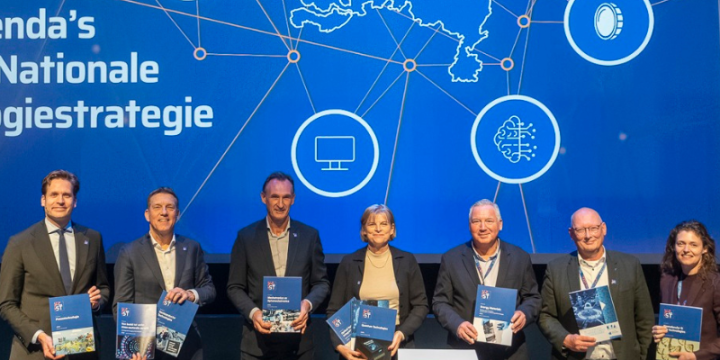De tweede oproep voor de R&D-regeling technologiedomeinen Einstein Telescope (ET) voor hightech bedrijven heeft geresulteerd in twee consortia die aan de slag gaan met de ontwikkeling van de benodigde technologieën rondom trillingsdemping. Beide consortia ontvangen hiervoor een subsidie van € 1.375.000. De consortia worden gevormd door mkb’s en kennisinstellingen. Lionite uit Delft is penvoerder namens een consortium en Onnes Technologies uit Leiden leidt het andere consortium.
Over de R&D-regeling
De R&D-regeling is onderdeel van het Einstein Telescope valorisatieprogramma voor hightech bedrijven, een programma van het Nationaal Groeifonds. Doel van de regeling is om innovatie en versnelde ontwikkeling van nieuwe technologieën voor de Einstein Telescope te stimuleren. En daarmee de kandidatuur voor de komst van de Einstein Telescope en het toekomstige verdienvermogen van Nederland te versterken.
Minister Eppo Bruins van het ministerie van Onderwijs, Cultuur en Wetenschap (OCW):
Ik heb grote verwachtingen over de potentie van de Einsteintelescoop. Met wetenschappelijke infrastructuur van wereldformaat binnen onze landsgrenzen krijgt de hele Nederlandse wetenschap een boost. En de technologie die we ontwikkelen voor de telescoop geeft Nederlandse techbedrijven een unieke voorsprong. De innovaties die hieruit voortkomen kunnen over een aantal jaren zomaar een plek krijgen in ons dagelijks leven. Ik wil me de komende jaren vol inzetten om de Einsteintelescoop hier te mogen gaan bouwen. “
Wat houdt trillingsdemping in?
De Einstein Telescope moet vele malen gevoeliger worden dan al zijn voorgangers. Zo kan het observatorium zwaartekrachtsgolven uit het hele zichtbare heelal waarnemen. Om die prestatie te halen, willen de onderzoekers alle mogelijke vormen van ruis uitbannen, zoals bewegingen van de grond en warmtetrillingen in de apparatuur. Binnen dit domein wordt gespecialiseerde trillingsdemping ontwikkeld die de kern- en hulpoptiek van de Einstein Telescope nog beter isoleert van de omgeving.
Consortium SENVIDET: extreem gevoelige versnellingssensoren
De zeven partners van het consortium SENVIDET (Sensor Engineering for Noise and Vibration Isolation and Damping in Einstein Telescope) ontwikkelen verschillende sensoren die bepalen of de spiegelophanging van de Einstein Telescoop uitwijkt door trage, langzame bewegingen van de omliggende rots. Een uitdaging, want zulke sensoren bestaan vooral voor snelle bewegingen zoals in ruimtevaarttoepassingen. SENVIDET wil afwijkingen onder de miljardste meter en miljardste hoekgraad bepalen met onder andere oversprongeffecten tussen glasvezels en seismometers in de omliggende rotslaag.
Lead engineer Jochem Klaassen van penvoerder Lionite in Leiden:
Deze opdracht is een echte uitdaging, want er is geen stil referentiepunt waar je je metingen op kunt baseren: niets op aarde staat stiller dan de Einstein Telescope. Dankzij deze subsidie kunnen we technologie ontwikkelen die voorbij de state of the art gaat. Die krijgt ongetwijfeld toepassingen in andere bedrijfstakken zoals de hoogwaardige fabricage of de halfgeleiderindustrie.”
Partners
Lionite (penvoerder), DEMCON B.V., Innoseis B.V., Nikhef, Quantified Air B.V., Somni Solutions B.V., VSL B.V., TU Delft (associate partner).
Consortium ICVI: trillingsdemping van cryogeen gekoelde optica
De acht partners van het project ICVI (Improved Cold Vibration Isolation for science and industry) ontwikkelen samen technologie die de meetopstelling afkoelt naar cryogene temperaturen zonder nieuwe trillingsbronnen te introduceren. De cryogene vibratie-isolatie technologie van ICVI spoort bijvoorbeeld ongewenste trillingen op met vrij zwevende, magnetische deeltjes in supergeleidende vallen. Daardoor ontstaat een opstelling die zowel heel koud is als heel stil hangt.
"Nederland heeft een rijk verleden in de extreem lage temperaturen; Leiden stond een tijd lang bekend als de koudste plek op aarde", zegt CEO Max Kouwenhoven van penvoerder Onnes Technologies in Leiden.
Met ICVI zetten we de volgende stap in deze traditie. Dat is interessant voor de wetenschap én voor bijvoorbeeld de halfgeleider- en famaceutische industrie."
Door te blijven investeren in onderzoek, onderwijs en innovatie kunnen we zorgen dat Nederland economisch en technologisch relevant blijft. Een groot project als de Einstein Telescope brengt ons land veel meer dan alleen een bijzonder wetenschappelijk observatorium.”
Partners
Onnes Technologies B.V. (penvoerder), Universiteit Leiden, JPE B.V., Nikhef, SRON, Piak Electronic Design B.V., Delft Circuits B.V., Magnetic Innovations B.V.
Overige openstellingen voor de R&D-regeling
“Momenteel is er een openstelling voor het technologiedomein optica”, vertelt Jorg van der Meij, programmamanager vanuit LIOF.
Deze sluit 12 september. Later dit jaar kunnen consortia een aanvraag indienen voor de domeinen thermische deformaties en voor vacuümtechnologie. Voor meer info verwijzen we graag naar onze website en we roepen hightech bedrijven en kennisinstellingen op hun interesse kenbaar te maken.“





